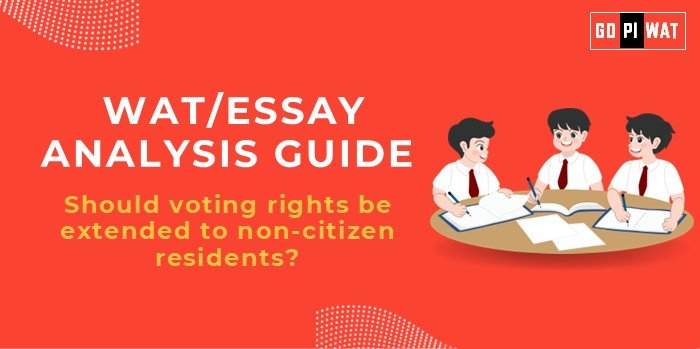📋 Written Ability Test (WAT) / Essay Analysis Guide
🌐 Topic: Should Voting Rights Be Extended to Non-Citizen Residents?
🌟 Understanding the Importance
Extending voting rights to non-citizens intersects democracy, ethics, and globalization. It challenges traditional notions of citizenship while emphasizing inclusivity. B-schools prioritize such debates as they require analytical reasoning, ethical consideration, and persuasive articulation. The topic is highly relevant in an interconnected world with increasing global migration.
🕒 Effective Planning and Writing
- Time Allocation:
- Planning: 5 minutes
- Writing: 20 minutes
- Review: 5 minutes
- Preparation Tips:
- Examine global examples of non-citizen voting rights (e.g., New Zealand, Ireland).
- Gather statistics on immigrant contributions and policy implications.
- Identify potential ethical and practical challenges to ensure balanced arguments.
📖 Essay Structure
📌 Introduction Techniques:
- Contrast Approach: “Democracies thrive on inclusivity, yet millions of non-citizens live without a political voice despite being integral to their nations’ economies and societies.”
- Solution-Based Introduction: “Granting voting rights to non-citizens, particularly at the local level, offers a pragmatic approach to recognizing their societal contributions while safeguarding national identity.”
📌 Body Paragraphs:
1. Achievements:
- Point: Inclusive democracies benefit from diverse perspectives.
- Example: Over 40 countries allow some form of non-citizen voting, boosting civic engagement.
- Data: Migrants, constituting 3.3% of the world’s population in 2015, contributed 9.4% of global GDP.
2. Challenges:
- Point: Extending voting rights risks diluting citizenship’s value and may polarize public opinion.
- Example: U.S. debates highlight fears of cultural shifts and economic burdens, despite significant tax contributions by non-citizens.
- Comparison: Estonia limits non-citizen voting to local elections to address such concerns.
3. Future Outlook:
- Point: A phased approach could ensure smoother implementation while addressing ethical concerns.
- Recommendation: Begin with local elections, monitor outcomes, and expand rights incrementally.
✅ Conclusion Templates
- Balanced Perspective: “Extending voting rights to non-citizens is a contentious yet critical step for modern democracies. A phased, local-level implementation can foster inclusivity while preserving the essence of citizenship.”
- Global Context: “As democracies evolve, integrating non-citizen residents into the political framework reflects the values of pluralism and inclusion, enabling nations to lead by example in an interconnected world.”
📝 Sample Short Essays
- Balanced Perspective: “While non-citizens significantly contribute to society, extending full voting rights may challenge the essence of citizenship. A phased, local-level inclusion balances representation with sovereignty.”
- Solution-Oriented: “Granting local voting rights to non-citizens can empower them while preserving national identity, ensuring democracy evolves with its changing demographics.”
- Global Comparison: “Countries like New Zealand and Sweden demonstrate how inclusive policies strengthen democracy. India and the US could adopt similar measures to reflect their pluralistic values.”


